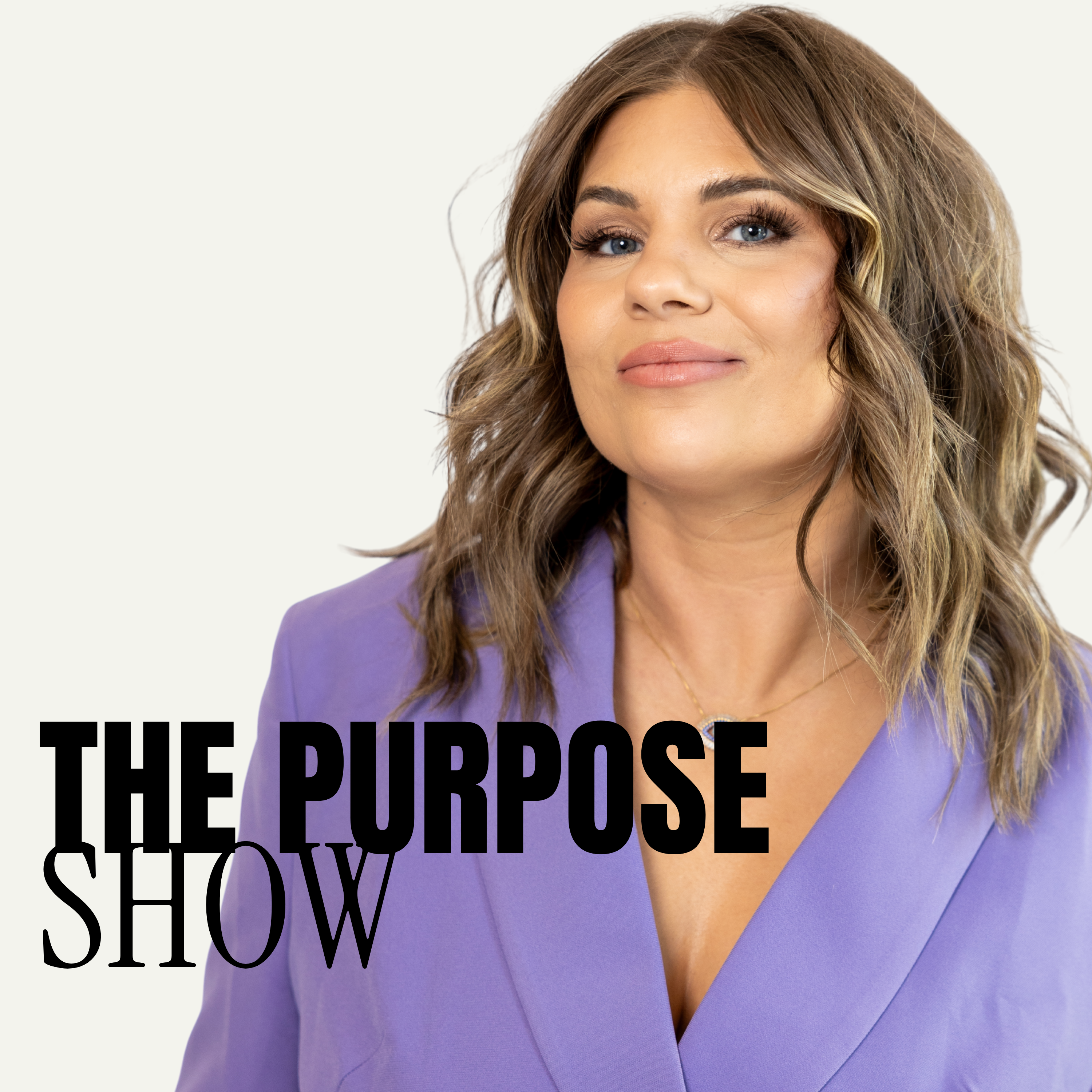
Motherhood Intended
Are you tired of scrolling your feed only to see the highlight reel version of motherhood? Join Jacqueline Baird, a passionate mom here to support other women on their unique journeys to motherhood and beyond.
You’ll hear from experts in the fields of women’s health, fertility, and family planning, as well as from the brave women who want their unique stories to be heard. We’ll talk about unexpected paths taken, miraculous moments experienced, and how we keep going on this beautiful and ever-changing journey as mom.
This podcast will also document Jacqueline’s current life as a mom of three, plus many reflections and insight from her decade long infertility journey including multiple losses, IVF, preterm deliveries, surrogacy, and more. Stay tuned as her family’s story continues to unfold.
If you feel like you can’t always relate to the picture-perfect stories you see, follow the podcast now and join a community that’s getting real about what it takes to be a mom.
Motherhood Intended
Self-Advocacy in Infertility and Motherhood: Navigating Doctor's Appointments and Care
Have you ever left a doctor's appointment feeling unheard, overwhelmed, or with more questions than answers? You're not alone.
Self-advocacy is a skill many of us weren't taught but desperately need, especially when navigating fertility challenges and motherhood. Jacqueline shares her personal experiences with infertility, pregnancy loss, and raising children with special needs, and how she discovered that being your own advocate isn't optional—it's essential.
In this episode you'll learn:
- Practical strategies for making your voice heard in medical settings.
- How to prepare for appointments.
- The importance of second opinions and switching providers when it's just not a good fit.
- Your body, your voice, and your story matter.
- You deserve care that sees you, hears you, and respects you. Whether you're sitting in a fertility clinic, an OB/GYN office, or a pediatrician's waiting room, this episode will empower you to advocate with confidence.
✨ Free Resource for You ✨
Want to feel more confident and prepared at your next doctor’s appointment? I created a simple, one-page tool just for you — the Doctor’s Appointment Prep Sheet.
With space to track your symptoms, jot down questions, and take notes, this free worksheet will help you walk into your appointment feeling empowered and walk out with clarity.
👉 Grab your free copy here: https://motherhoodintended.kit.com/prepsheet
Connect beyond the podcast:
- Your Village
- Facebook group
- Text
- Email: hello@motherhoodintended.com
- Support the show!
CURIOUS ABOUT SURROGACY? Help give the absolute greatest gift to deserving intended parents and learn more about becoming a surrogate (plus you can earn up to $650 just for taking the first few simple steps!): share.conceiveabilities.com/hello12
__________________________________________________________________________________
💛 You don’t have to do this alone. Join Your Fertility Village — a safe, supportive community for women on their fertility journey. 🌻__________________________________________________________________________________
Are you tired of scrolling your feed only to see the highlight reel version of motherhood? If so, then you're in the right place. Welcome to the Motherhood Intended Podcast. I'm your host, jacqueline Baird, and I'm a passionate mom here to support women like you in their unique journeys to and through motherhood. I have been through it all. We're going to be talking about things like trying to conceive, infertility, ivf, surrogacy, mom life and more. It's time to get real about what it takes to be a mom and come together in the fact that things don't always go as planned. So here we go. Hi, friends, and welcome back to Motherhood Intended. I'm your host, jacqueline.
Speaker 1:I hope your week is going well. For me it's been well. I'm just going to say not just for me. I just feel like the world is extra heavy these days for so many reasons. It's like I will wake up, I will look at my Instagram, I will read a news article and just feel completely deflated. If you can relate, regardless of your beliefs, your political views, whatever it is, I think we can all agree that at one point or another, there is just heaviness in the world on all fronts. So much going on at all times and obviously all the information, whether it is true or false, is always at our fingertips, and it can be a lot. It can be overwhelming, it can be overstimulating and if you're super empathetic, like I am, it can bog you down the worries of the world right, as if we don't have enough on our shoulders as women, and especially women who are going through infertility or women who are busy moms, we've all got a lot on our plates, so I just hope that you know that you're doing great Deep breaths, unplug when you need to hang in there, call a friend, go for a walk. Don't let the weight of the world pull you down all the time. Okay, this is advice I need to take for myself, because I keep getting sucked in to the news and social media and it's taking a toll on my mental health. So I'm happy to be on the mic talking to you today, especially with this topic, because it is one that is near and dear to my heart. It is something I kind of almost preach to people now, just because live and learn. It is something that I had to learn to do for myself, based on trial and error, essentially.
Speaker 1:So if you've been on any kind of fertility or motherhood journey, you probably know how overwhelming it can feel when you're sitting across from a doctor, sometimes scared, sometimes hopeful, sometimes exhausted, and you walk away thinking wait a minute, minute, did they really hear me? Like? Did I even get my questions answered? I've been there, truly. I've been there more times than I can count. I've been there myself through infertility and different medical diagnosis and unexplained things that were going on with my health, and I've been there with my kids as well. I've been there with my son in the NICU. I've been there with my kids as well. I've been there with my son in the NICU. I've been there throughout my kid's childhood.
Speaker 1:So far in these seven years of parenthood, whether it was with injuries or sensory processing or autism, adhd, hitting milestones right, the one thing with babies and toddlers is always on our mind is those milestones, and I can tell you more times than I can count that I sit in an appointment and be like hold on, did I actually get out of this what I need? Did I get my questions answered? It's more times than I can count that I've been in this position and one thing I've learned, and learned the hard way, is this you deserve to be your own best advocate. No one else will speak up for you in the same way that you can. Today, I'm going to share some practical tools and mindset shifts that will help you feel confident in advocating for yourself at doctor's appointments, when seeking second opinions and when finding the right care. So let's start with why this even matters, right, why does self advocacy matter? So doctors are trained professionals. They've studied for years and bring expertise that we need. But here's the truth you are the expert on your own body.
Speaker 1:I remember times when I sat in an office sharing my symptoms or my concerns and I could tell the doctor was just like brushing past it or minimizing it. Maybe they were rushed, maybe they didn't see the urgency, but I felt it Deep down. I knew something wasn't right and, honestly, this began long ago, when I was a preteen, a teenager. I was 12 years old, 13 years old, actually. It probably took a few more years than that, because my first issue was with my menstrual cycle. Although at that young, young age, when I first got my period, I didn't know what was right, what was common, what wasn't common. I just thought well, this is how it is. I have debilitating periods. They are heavy, they are painful. I can barely get through a school day with them. They were awful, let me just say, and at that point I didn't know to share concerns.
Speaker 1:But as I got older, I just knew something wasn't right and so I asked questions, and one of the times that I also remember speaking up was when I wasn't getting pregnant. I had read that for my age you know, I was 26, that I should try for a year, try for a year and then, if I'm still not pregnant, then I can go back to my doctor and we can talk about seeing a fertility specialist or make a choice from there. Well, I'm going to be honest, I didn't do that. I waited about six months, because you know what, I know my body and I knew that just something was off. I knew that there had to be a reason why I was still not pregnant, and you know what there was.
Speaker 1:At that point I found out that I had a blocked fallopian tube. I had polyps that needed to be removed. My thyroid was not in the right level that it should be. I was dealing with hypothyroidism and needed medication to help deal with this and increase my chances of getting pregnant. If I hadn't spoken up, if I hadn't pressed for answers, I would not have gotten the care I truly needed.
Speaker 1:And honestly, this comes up later in my motherhood journey as well, with my son. If I did not express my concerns for some of his behaviors and ask the hard questions that so many people brushed off, I wouldn't know that my oldest son is on the autism spectrum. He's level one and high functioning, which is hard oftentimes to detect. But the older he got and I saw him in more social situations, I said you know what? I need to advocate for him because I need to make sure that he has the tools that he needs to succeed in a world that might not necessarily be built for him, and I know many of you listening have been through the same situation, especially if it's with yourself. I already know you're constantly thinking of your fertility, when you want a baby so bad and you are trying and month after month it's not happening for you. You're thinking about what you truly need.
Speaker 1:Self-advocacy isn't about being difficult or questioning authority. It's about protecting your health, your dreams and your future family. I spent so many years just listening to doctors meaning whatever they said, I was going to take it at face value because I felt like they know everything. They know my body more than I do, but I learned many times over, in many situations, that that's just not the case. At the end of the day, you know your body and you need to trust your gut, which is why self-advocacy is so important. So how do we actually do this? How do we advocate for ourselves?
Speaker 1:Let's start with appointments. My first suggestion is to write everything down. I'm talking symptoms, timelines, questions. Don't rely on your memory, because once you're in that exam room it's really easy to just freeze up or feel rushed, and so having notes in front of you make sure your voice is heard clearly and it makes sure you're going to address all those things that have been on your mind. Secondly, bring support, if you can A partner, a trusted friend, even like a notebook on your phone, someone or something to back you up at that appointment. Sometimes just having another set of ears in the room can make all the difference. I know that in the past there has been appointments where I'm already feeling overwhelmed and you know I might hear something that is starting to make sense that the doctor's mentioning, and so I'll kind of back off with some of the other concerns I had, and you know what.
Speaker 1:No, don't make yourself smaller to kind of fit the narrative of what you're being told, even if your doctor's right and of course, doctors are very educated and skilled but you owe it to yourself to still ask. There's no harm in asking questions when you have concerns. Third, practice your script. Okay, it might feel silly, but rehearse how you'll say what's important to you. Try something like I'm really concerned about whatever specific symptom you have and I'd like us to explore it further. When you say it that way calm, clear and direct it's a lot harder for your concerns to be brushed aside. I mean, picture if you're going in there and be like oh my gosh, I've had this pain and that pain and I don't even know, and you're kind of just all over the place. Right away, your doctor's probably just going to like want to calm you down and reassure you, as opposed to investigating further and hearing your actual concerns. And lastly, it's kind of what I just said don't minimize your pain. Okay, you don't need to apologize for being there or for asking questions. You are allowed to take up space in that room.
Speaker 1:For those of you who are going through infertility and you finally get pregnant, I feel like I especially want you to hear this, because this is something that I did and it wasn't until later I learned that I shouldn't. I should not minimize my pain, because your pain, your feelings, your concerns, they're all valid. The first time I was pregnant, any little thing, I was like, oh that's, you know, it's no big deal, like this is pregnancy. Right, I'm pregnant, this is what's supposed to happen, and most of the time you know it was nothing to be concerned about. But why should I bog down my mental health and my worry to make my pain smaller? Like, just be honest about what you're feeling. No question is silly. No pain is too small. Do not minimize your pain.
Speaker 1:Now let's talk about second opinions. It's very likely that on an infertility journey, whether you're doing IVF, you're looking for different treatment options, you're considering different family building avenues. You're probably going to want to ask for a second opinion, and I want to normalize this right now. Asking for a second opinion does not mean you don't trust your doctor. It means you're gathering more information to make the best decision for yourself and, honestly, if you have a good doctor in the first place, they'll probably even suggest or welcome you to get a second opinion.
Speaker 1:I remember my MFM doctor. I will never forget him telling me when we were having the discussion of what had happened with my placental abruption and losing my daughter, maren, at 20 weeks. You know that was a hard conversation to have, but he was honest with me and said I don't know what we would do differently in a subsequent pregnancy to avoid this or any other issue that has come up in your previous pregnancies. Could it be fine? Yes, he said, but it also couldn't be fine, he said. From my opinion, I just can't pinpoint one reason why I can confidently say you would have a next uneventful pregnancy. And the next thing he said was I consulted the other doctors in my practice and unfortunately they're stumped as well, but I highly recommend you get a second opinion. He said I want what's best for you and your family and I want you to feel good about this decision, decision meaning that it wasn't going to be safe for me to carry another pregnancy, which ultimately led me to surrogacy and was an amazing choice for our family. But I respected him so much in that moment, so I want to normalize it.
Speaker 1:Asking for a second opinion does not mean you don't trust your doctor, because I trust that doctor with my life. So think of it like this If you were planning a wedding, you wouldn't just get one quote from one photographer and call it a day. You'd compare, you'd research, you'd make sure it felt like the right fit. Why should your health, your fertility, your family be any different? When I sought second opinions in my own journey, I sometimes walked away realizing okay, like my doctor really does have the right plan. And other times it completely changed the direction of my care. Both outcomes were valuable. Side note most insurance plans cover second opinions and in many cases, like I said, doctors and good doctors expect you to get them. It's a sign you're taking your health seriously.
Speaker 1:Now let's go a step further Finding the right provider for you. So here's the truth. Not every doctor will be the right doctor for you. So here's the truth Not every doctor will be the right doctor for you, and that's okay. For example, the very first fertility doctor I saw. Obviously I didn't have anyone to compare it to and truthfully, I did not search around for the best fertility doctor. I did a quick Google search. It was near my house. According to everybody else, he was very highly rated. And you know what we did get pregnant. I was on our fourth IUI. That was when we got pregnant with our twins. Now, unfortunately and if you've been with this podcast for a while, you know my story, but unfortunately I miscarried the twins in my second trimester. But from a fertility getting pregnant perspective, that doctor did help me get pregnant. He also helped unblock my fallopian tube, put me on the right medications and gave me a general path for care.
Speaker 1:Now, after that loss and after some time, we came back the next year to do more IUIs. But everything kind of rubbed us the wrong way after that. It wasn't the right doctor for me. His bedside manner, the way he brushed off our loss, the way he didn't investigate or offer up any kind of support as to why this happened or even lead me in the direction of a doctor who could help kind of make sense of all this before just blindly getting pregnant again. That didn't sit well with me and that's okay, because you know what I've met many other women and he still has rave reviews and that this doctor was amazing for so many people. For me it was not the right fit, which is why we ended up switching providers, moving on to IVF, and that is the person who has helped us complete our family, even through surrogacy.
Speaker 1:So here are a few signs you're in the right place. Your provider listens without interrupting. They take time to explain things in a way you can actually understand. They respect your feelings, even if they don't have all the answers right away. So, on the flip side, here are some red flags to keep in mind A doctor that dismisses your concerns, they gaslight your symptoms or they push treatments without explaining why. This was the issue with me and my first fertility doctor is that he just kept pushing IVF, ivf, ivf, ivf. And I didn't understand because we were essentially unexplained infertility and we had gotten pregnant from an IUI before, which is less expensive, less invasive, all the things. And I just didn't like the pushiness without understanding the science behind it and all of that. Another red flag is if you walk out of an appointment feeling more confused or unseen than when you walked in, that's your sign that it's not a good fit.
Speaker 1:Okay, and please remember, switching providers is not failure, it's an act of self-love. You're literally saying I'm worthy of care that sees me, hears me and respects me. So here's what I want you to take away from today I want you to remember that your voice matters, your story matters and, most importantly, your body matters. You don't need to be easy, you don't need to be quiet. You need to be heard, respected and cared for, and sometimes that means showing up with a notebook full of questions, asking for another opinion or even walking away from a provider who isn't serving you well. And trust me, I know that that can often be difficult, especially when you've been working with a provider for so long, or you've been on a long journey and you just want to get pregnant, or you just want an answer to your medical question. But I promise you, in the long run, if you are feeling those ways and you really it's just time to walk away from a provider that's not serving you. It will benefit you in the long run. If this episode spoke to you, I'd love for you to share it with a friend who might need that reminder too.
Speaker 1:And if you're craving a community of women who really get it, come join us inside your Fertility Village. It's a safe place where your voice will always matter. There's a link in the show notes to get on the waitlist, because doors for your fertility village will be opening in the next few weeks and by joining when the doors open, you will be a founding member of your fertility village. Not only will you get to be on the ground floor of this amazing community and help build it alongside me, but you will lock in a $7 a month, lifetime price. That's literally one Starbucks coffee and that's a monthly price. So give up one Starbucks coffee a month and price that's literally one Starbucks coffee and that's a monthly price. So give up one Starbucks coffee a month and you could be a founding member of your fertility village, and that membership price is for life. So as this community grows, as the resources build and we offer more and more for you, your cost will stay the same and the founding member window won't be open forever. So join while you can and take advantage of this amazing opportunity. The link in the show notes will get you on the email list so you'll be the first to know when those doors are open and you can join us. Your village is waiting for you.
Speaker 1:I'll leave you with this affirmation today Hear this, remember it and repeat after me. This affirmation today. Hear this, remember it and repeat after me you are worthy of care that listens, honors and supports you. Your voice matters. Your body matters and your story matters. Thank you so much for spending this time with me today. I hope you have a great rest of your week Until next time. I'm Jacqueline, and this is Motherhood Intended.
Podcasts we love
Check out these other fine podcasts recommended by us, not an algorithm.
Abundant Ever After with Cathy Heller
Abundant Ever After with Cathy Heller
The Purpose Show
Allie Casazza
The Mel Robbins Podcast
Mel Robbins
The Amy Porterfield Show
Amy Porterfield
The Live Free Podcast with Micala Quinn
Micala Quinn
Entreprenista
Entreprenista Media
All Things Conceivable: A Surrogacy Podcast with Nazca Fontes
All Things Conceivable Surrogacy Podcast
Matt and Doree's Eggcellent Adventure: An IVF Journey
Matt Mira and Doree Shafrir
Big Time Adulting
Caitlin Murray
